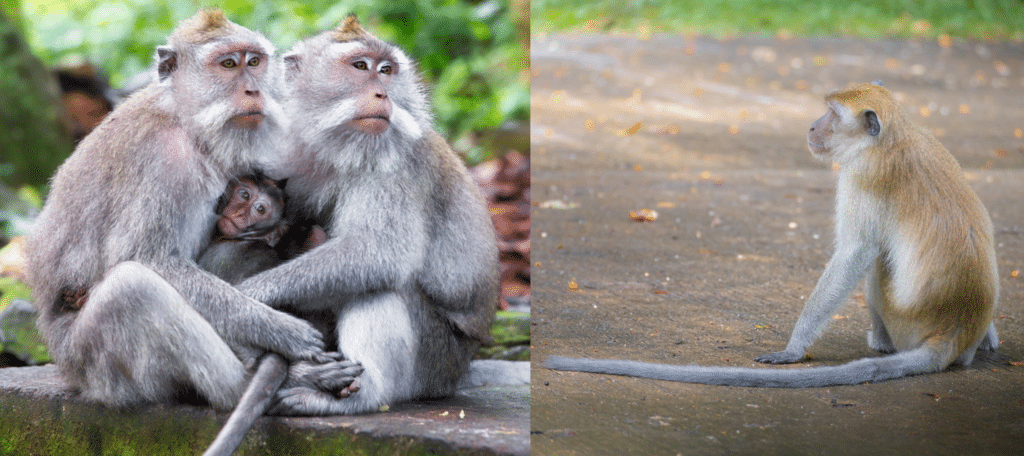2 Types of MONKEYS in Singapore! (2025)
What kinds of monkeys live in Singapore?

If you visit Singapore, it’s only natural to ask yourself the above question. I mean, who doesn’t want to see monkeys!?
Luckily, there are quite a few species you should be able to find. So, keep reading to learn how to identify each primate. Plus, you are going to learn some fun and interesting facts. Pictures and range maps are also included!
34 monkey species that live in Singapore:
#1. Long-tailed Macaque
- Macaca fascicularis
Also known as the Crab-eating Macaque or Cynomolgus Monkey.

Identifying Characteristics:
- Adults are 38-55 cm (15-22 in) long with tails that reach 40-65 cm (16-26 in).
- They have gray or brown coats that grow paler on the underparts and a white strip of hair on the upper lip that looks like a mustache.
Long-tailed Macaques make their home in shrublands, lowland rainforests, and coastal forests. But watch out; these cheeky monkeys in Singapore might sometimes raid farms or dumpsters for a snack. They’re even known to steal food right from your hand!
Speaking of snacks, these monkeys in Singapore aren’t picky.
They love fruit, but they’ll also forage for roots, leaves, and small critters. Plus, they’re super smart! They peel sweet potatoes with their teeth, wash their food before eating, and use rocks to bash clams, crabs, and oysters open.
Long-tailed Macaques are social creatures. They live in groups of 20 to 100, mostly made up of females and their young. When the males grow up, they venture out to find a new group of their own. Fights within a group are frequent, but these clever monkeys in Singapore usually reconcile afterward to keep the peace.
#2. Dusky Leaf Monkey
- Trachypithecus obscurus
Also known as the Spectacled Langur, Spectacled Leaf Monkey, and Dusky Langur.

Identifying Characteristics:
- Adults are 60-67 cm (24-26 in) long with tails that are 50-85 cm (20-33 in) long.
- They have gray faces and white lips. The white rings around their eyes look like glasses!
- Their coats are shades of brown, black, or gray. The underparts are paler in contrast.
To see Dusky Leaf Monkeys in Singapore, visit a national park.
These primates are a delightful sight and plentiful on nature reserves. In the wild, they inhabit tropical and coastal forests. Up to 20 individuals form a troop guarded by an alpha male. No need to worry about monkey business, though, because conflicts between groups are rare and usually sorted out quickly!
Dusky Leaf Monkeys are impressively acrobatic, using their long tails for balance as they jump from branch to branch. However, they have a quirky habit of sitting still for long periods, comfy and cozy on their padded bottoms. Their keen eyesight also lets them judge distances with great accuracy.
Though their teeth are specifically adapted to munch on leaves, they also love eating shoots, flowers, and fruits. Dusky Leaf Monkeys have enlarged salivary glands to help break down all that tough cellulose in their food. Plus, the bacteria in their stomachs neutralize any harmful toxins. Quite handy, if you ask me!
For more information about animals in Singapore, check out these guides:
Which of these monkeys in Singapore is your favorite?
Leave a COMMENT below!


